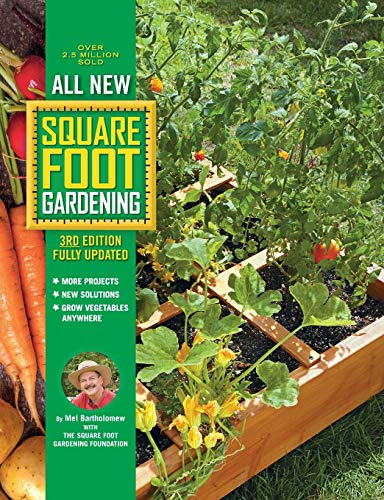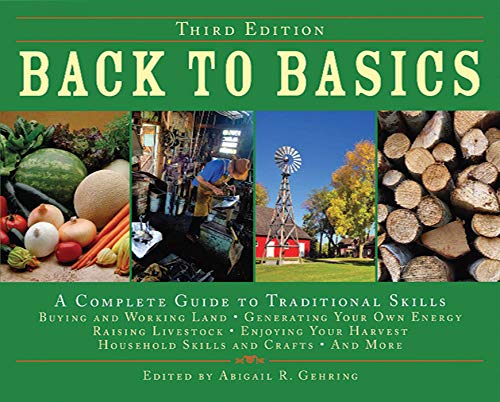(Part 3) Top products from r/SelfSufficiency
We found 20 product mentions on r/SelfSufficiency. We ranked the 61 resulting products by number of redditors who mentioned them. Here are the products ranked 41-60. You can also go back to the previous section.
41. Capitalism: The Unknown Ideal
Sentiment score: -1
Number of reviews: 1
Signet Book
 Show Reddit reviews
Show Reddit reviews43. New Complete Self-Sufficiency : The Classic Guide for Realists and Dreamers
Sentiment score: 1
Number of reviews: 1
 Show Reddit reviews
Show Reddit reviews44. All New Square Foot Gardening, 3rd Edition, Fully Updated: MORE Projects - NEW Solutions - GROW Vegetables Anywhere (All New Square Foot Gardening (9))
Sentiment score: 1
Number of reviews: 1
 Show Reddit reviews
Show Reddit reviews45. One Second After (A John Matherson Novel)
Sentiment score: 0
Number of reviews: 1
Tor Books
 Show Reddit reviews
Show Reddit reviews46. Finding & Buying Your Place in the Country (Finding and Buying your Place in the Country)
Sentiment score: 1
Number of reviews: 1
 Show Reddit reviews
Show Reddit reviews47. Farming for Self-Sufficiency: Independence on a Five-Acre Farm
Sentiment score: 0
Number of reviews: 1
Used Book in Good Condition
 Show Reddit reviews
Show Reddit reviews48. The Backyard Homestead: Produce all the food you need on just a quarter acre!
Sentiment score: 0
Number of reviews: 1
Following the author's suggestions, you can harvest your own fruits and vegetables, nuts, eggs, even grain and meat, all a few feet from your back doorAlso includes instructions on milling grains for flour, making your own cheese and cooking, canning, curing or pickling the fruits of your labor.Madi...
 Show Reddit reviews
Show Reddit reviews49. The Complete Book Of Underground Houses: How To Build A Low Cost Home
Sentiment score: 1
Number of reviews: 1
Used Book in Good Condition
 Show Reddit reviews
Show Reddit reviews50. Creating a Life Together: Practical Tools to Grow Ecovillages and Intentional Communities
Sentiment score: 0
Number of reviews: 1
Creating a Life Together: Practical Tools to Grow Ecovillages and Intentional Communities
 Show Reddit reviews
Show Reddit reviews51. Earth-Sheltered Houses: How to Build an Affordable Underground Home (Mother Earth News Wiser Living Series)
Sentiment score: 1
Number of reviews: 1
New Society Publishers
 Show Reddit reviews
Show Reddit reviews52. Gardening When It Counts: Growing Food in Hard Times (Mother Earth News Wiser Living Series)
Sentiment score: 0
Number of reviews: 1
New Society Publishers
 Show Reddit reviews
Show Reddit reviews53. Root Cellaring: Natural Cold Storage of Fruits & Vegetables
Sentiment score: 0
Number of reviews: 1
Storey Publishing
 Show Reddit reviews
Show Reddit reviews54. Back to Basics: How to Learn and Enjoy Traditional American Skills (Second Edition)
Sentiment score: 0
Number of reviews: 1
 Show Reddit reviews
Show Reddit reviews55. The Encyclopedia of Country Living: An Old Fashioned Recipe Book
Sentiment score: 0
Number of reviews: 1
Used Book in Good Condition
 Show Reddit reviews
Show Reddit reviews56. Earthship: How to Build Your Own, Vol. 1
Sentiment score: 0
Number of reviews: 1
Used Book in Good Condition
 Show Reddit reviews
Show Reddit reviews57. Handy Farm Devices And How To Make Them (1909)
Sentiment score: 1
Number of reviews: 1
 Show Reddit reviews
Show Reddit reviews



I’ve been thinking along the same lines of a garden to allow me a full diet with lots of variety. Good luck in your journey!
I have been considering using the [Square Foot Method](All New Square Foot Gardening, 3rd Edition, Fully Updated: MORE Projects - NEW Solutions - GROW Vegetables Anywhere https://www.amazon.com/dp/0760362858/ref=cm_sw_r_cp_api_i_p8uSCbBV7NCH2) to keep everything compact.
So far, it seems that it’ll be a slightly higher startup cost, but if I can compost effectively, building the boxes is a weekend project with some spare wood. I’m hoping it’ll allow enough nutritional variety, plus I plan on building a lot of solid companion plots to let nature do what she does best.
Haven’t started any of it yet, but I felt it was a great resource to change my perspective of how much I would really need and how much I could practically take care of.
I’m also considering aquaponics, but that’s a project for waaaaaaaaaay down the line.
Depending on where you live (climate) and your local soil and runoff conditions you will have lots of things to consider.
This book is good.
http://undergroundhousing.com/book.html
This amazon page has some other books (that I have not read, so I can't comment on them)
https://www.amazon.com/Complete-Book-Underground-Houses-Build/dp/0806907282
Here is my thinking (just from reading, my own home is an above ground timber frame built for a Canadian climate)
[1] Surface bedrock (Like Halifax NS where I grew up) means you dig to the bedrock or blast, and then build a home you are planning to cover with earth. This gives you a sturdy home/foundation but you really have to take the natural water flow into account.
[2] Close to the water table (near most swamps, streams and lakes) means you are more worried about water getting into your home from seepage. Take great care to prepare drainage and a sealed waterproof membrane below AND around your house. Remember, a few dollars and paranoia is better than flooding every spring. It is probably best to build up by making a hill with your home and then covering it with earth.
[3] Talk to companies who pour concrete foundations. They are more likely to know the special conditions in your area.
[4] If you want to go multiple levels down you run into special problems with construction and ventilation. Talk to a company that builds foundations for high rise apartments that typically have 3 or 4 levels below ground.
[5] If you are wanting to do much of this yourself, practice first by building an "underground greenhouse (aka walipini 1 2
This Book is the best I have found. I suggest using concrete in some way on your greenhouse so you can learn about concrete before you DIY a concrete foundation for a home.
edit: The book above suggests PVC pipes to support the plastic "roof". In my area where heavy snow loads are a thing you should use 2x6 or 2x8 spaces no more than 16 inches apart. Look at your local building codes for what is required for your roof.
I don't know about making pre-fabs or building them like a contractor, but there is a guy who has an earth-sheltered home building school of some sort. I too am interested in efficient, environmentally friendly (or at least friendlier) homes and found this book by Rob Roy. He has made several types of earth sheltered homes, including one that was completely underground. I like his book because he goes through the entire process of building both homes he talks about as a learning experience; he writes about all the mistakes that he made and how to potentially avoid them, how to save money, and re-use old materials. For example, one thing that he mentioned, that I would NEVER have thought of, was how he designed his windows. Before he built the frames, he went to a window manufacturer and asked if they had any returns, which they would have to essentially eat the cost for and got those for a huge discount.
First there are the essentials:
Some things you want to avoid:
Here are some criteria that you might want to consider:
Finally, get a hold of the book, Finding and Buying Your Place in the Country, which will tell you about easements and laws governing what you can and cannot do with water on your land and shady practices of realtors, etc. It's worth a read.
Another idea for a source of cool water...I have this book, Handy Farm Devices, written in 1909. In it there is a design for an ice house (14'X14' structure, 2 feet of sawdust for insulation, ventilation at the top and drainage at the bottom). You fill the ice house with ice and there is an adjacent room where the farmer stores all his milk... the ice melts slowly all summer, and the cool water runs through pipes in the milk house, keeping it cool.
John Seymour has pretty good ideas for one acre and five acre homesteads, and this book is what made my wife and I take the leap...
http://www.amazon.com/gp/aw/d/0751364428?pc_redir=1406731652&robot_redir=1
I have well-worn and much treasured copy of The Complete Book of Self Sufficiency dating from the 70's. I wonder how much it has changed, and if I will ever get a chance to butcher a pig.
Some good books for reference.
http://www.amazon.com/Mini-Farming-Self-Sufficiency-Brett-Markham/dp/1602399840/ref=sr_1_1?ie=UTF8&qid=1333634510&sr=8-1
http://www.amazon.com/Back-Basics-Complete-Traditional-Edition/dp/1602392331/ref=sr_1_1?ie=UTF8&qid=1333634541&sr=8-1
Check out Eliot Coleman's books on winter gardening, particularly this one. He runs a market garden in Maine, and successfully grows and markets vegetables in the winter. I don't have a cold greenhouse yet, but I'm planning one.
If you grow a lot of veggies in the summer, you can do a lot of preserving in the fall to get you through. Beans are easy to dry. I have this book and have built a root cellar. And I've purchased a pressure canner and preserve all sorts of stuff.
Good book, I have it in its two earlier versions (Complete Book of Self-Sufficiency/New Complete Book of Self-Sufficiency).
I've found Food for Free by Richard Mabey useful, but again its UK-centric.
I like Steve Solomon's Gardening When It Counts: Growing Food in Hard Times, especially the parts about gardening when water is at a premium.
Hunt Gather Grow Eat
http://www.amazon.com/gp/product/0962676705/ref=oh_details_o01_s00_i00
The Encyclopedia of Country Living
This!
Are you perhaps looking for something along this line?
[Creating a Life Together: Practical Tools to Grow Ecovillages and Intentional Communities Paperback – January 1, 2003
by Diana Leafe Christian] (http://www.amazon.com/Creating-Life-Together-Ecovillages-Intentional/dp/0865714711)
http://www.amazon.com/Farming-Self-Sufficiency-Independence-Five-Acre-Farm/dp/0805205101/ref=sr_1_1?ie=UTF8&qid=1411734444&sr=8-1&keywords=Farming+for+Self-Sufficiency%3A+Independence+on+a+Five-Acre+Farm
One Second After seems pertinent
There is not conflict between individual's rights. Violating your rights is not in my interest. My rights end at your property. Do whatever you want with your property. For me to say I have the right to decide what you do on your property leads to...well...our current state of affairs.
However, I just finished a many day argument with a redditor about this stuff, in which I made no progress in convincing him, which was very disappointing. I'm not really ready to get in to it again so soon. Capitalism: The Unknown Ideal does a good job of explaining my opinions on the subject.